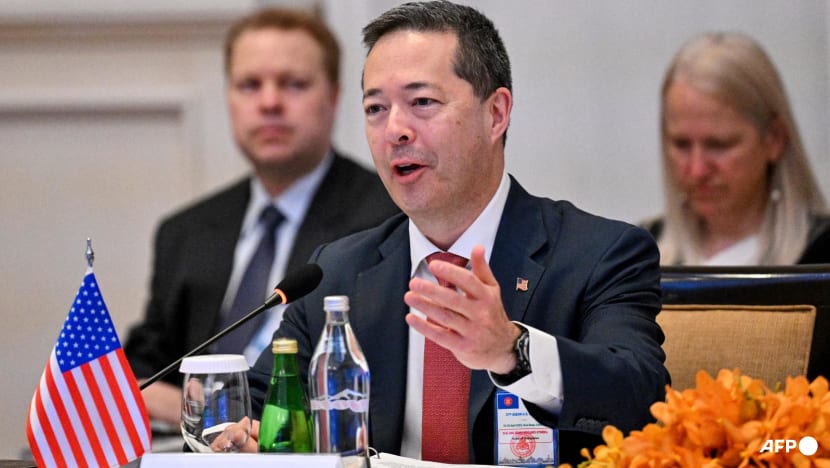Trump's Thailand ambassador pick says Bangkok border conflicts don't help alliance

US Senior Bureau official Sean O'Neill speaks during the 37th US-ASEAN (Association of Southeast Asian Nations) Dialogue in Siem Reap province on Apr 22, 2025. (Photo: AFP/Tang Chhin Sothy)
WASHINGTON: United States President Donald Trump's nominee for US ambassador to Thailand said on Tuesday (Jul 29) he would tell Bangkok, if confirmed in the post, that conflicts like Thailand's recent border skirmish with Cambodia do nothing to help the Thai people or the country's alliance with Washington.
Sean O'Neill, a career foreign service officer who has served twice before as a diplomat in Thailand, made the comment at his Senate confirmation hearing when asked about five days of clashes between Thailand and Cambodia that killed at least 43 people and displaced over 300,000.
Thai and Cambodian leaders met in Malaysia on Monday and agreed to a ceasefire to halt their deadliest conflict in more than a decade.
That agreement came after Trump warned the Thai and Cambodian leaders at the weekend that trade negotiations with the US would not progress if fighting continued.
Asked what he would do to ensure that the ceasefire became a long-term peace agreement, O'Neill said: "I think the first thing I would do is to point out to Thailand, which is one of our only treaty allies in Asia, that wars like this, conflicts like this, do nothing to help their people.
"They do nothing to strengthen our alliance, they do nothing to address the challenges that both of our countries face. They are just a needless waste of life and treasure."
O'Neill also said Thailand should not lend legitimacy to the military government in its neighbour Myanmar.
He said the State Department's position was not to encourage Myanmar to hold "sham" elections the military was looking to hold in the autumn.
"If confirmed, I would encourage Thailand not to recognise an election that does not include the participation of over 50 per cent of the country, while most of the opposition leaders are in prison," he said.
Vikram Nehru, senior fellow at the Foreign Policy Institute at Johns Hopkins University School of Advanced International Studies, said Thailand and Cambodia have to "set aside nationalistic principles and try to agree that a lasting peace will require concessions on both sides".
"It's important to recognise that this is not the time for ardent nationalism, but this is the time for ensuring that both sides are reasonable in coming to a peace. Any long-term arrangement is going to have to address some pretty difficult problems," he told CNA's Asia First.
Nehru said the first and perhaps most difficult of the issues is a clear demarcation of the border, which has been the reason for the long-lingering dispute.
"The second is to ensure some arrangement to monitor the ceasefire, to monitor confidence-building measures," he noted.
"The third is to ensure that economic integration continues, that there is greater economic investment on both sides of the border, so that there is a stake of both Thailand and Cambodia in a lasting peace."
Nehru said stability and peace in Southeast Asia has been the cornerstone of its growth.
"Any such border skirmishes, especially if they erupted into something much larger, could potentially threaten that stability and peace, and thereby threaten Southeast Asia's economic growth," he added.














